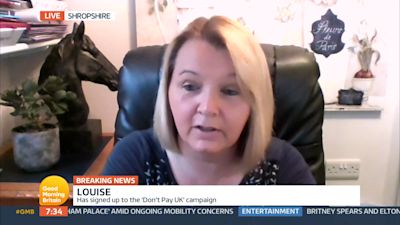'Demand as much as you like, I'm not paying': Don't Pay UK campaigner boycotts soaring energy bills

A Shropshire woman has warned energy firms "you can demand as much as you like, I'm not paying it", after the price cap rose by a staggering 80%.
Regulator Ofgem today announced the maximum amount households can charged for energy will climb from £1,971 to £3,549 from October 1.
That means annual bills are set to skyrocket by at least 80% for households on a typical default tariff - and even higher for those with prepayments, who are often the most vulnerable customers.
Louise, who pays medical costs for her seriously ill relatives, is among thousands who are planning to refuse to pay the soaring bills, as part of the Don't Pay UK boycott campaign.
She told ITV's Good Morning Britain: "I feel like we were being bullied, to be honest."
"This situation where they have open access to your bank account to just hike up this direct debit and just take your money - I just felt really angered by that."
Louise said she had signed up to the Don't Pay UK campaign, which calls for people to stop their energy bill payments from October.
The group hopes to pressure energy companies into slashing their prices and has support from around 114,500 people.
However, charities such as Step Change and Citizens Advice have warned that withholding payment could have "serious" consequences. These include an impacted credit score and being disconnected from and energy supply.
Louise explains to GMB why she will not be paying her energy bills in October.
Louise hopes that, by not paying, the government will take further steps to tackle the energy crisis. Money is "the only language this government speaks", she argued.
"It's money, it's all about money."
She explained she didn't fear being targeted by authorities or debt collectors, or having a credit record black mark against her name.
She said she and other people backing the Don't Pay UK campaign were law-abiding, who were only planning to withhold bill payments for a short period, to make an "impact".
"We're ordinary people who want to stand up and be listened to."
Louise said she had the right to withhold a bill payment, and personally believed due to the overwhelming number of people preparing to refuse to pay, the chances of a court summons would be "low."
"We're not being irresponsible," she added. "The irresponsible people are the energy companies and the government."
She added that the government had plenty of time to foresee the crisis and plan for it.
As Ofgem announced the new price cap on Friday, the regulator's chief executive urged the incoming prime minister to “act further” to tackle the impact of price rises.
Want a quick and expert briefing on the biggest news stories? Listen to our latest podcasts to find out What You Need To Know
Bill payers may have to wait to discover what further action might be taken, with the the Tory leadership race result yet to be confirmed. As they wait, many households are likely to try to reduce bills by keeping their homes colder, cooking in bulk and taking shorter and less regular showers. Experts also say that turning down the flow temperature on your boiler and switching off your boiler’s pre-heat mode can save hundreds of pounds this winter. But such savings are likely to offset only a small proportion of the mammoth price cap.
The Treasury issued a statement from Nadhim Zahawi which he said “help is coming” from the government.
“I know the energy price cap announcement this morning will cause stress and anxiety for many people, but help is coming with £400 off energy bills for all, the second instalment of a £650 payment for vulnerable households, and £300 for all pensioners.
“While (Russian President Vladimir) Putin is driving up energy prices in revenge for our support of Ukraine’s brave struggle for freedom, I am working flat out to develop options for further support.
“This will mean the incoming prime minister can hit the ground running and deliver support to those who need it most, as soon as possible.”